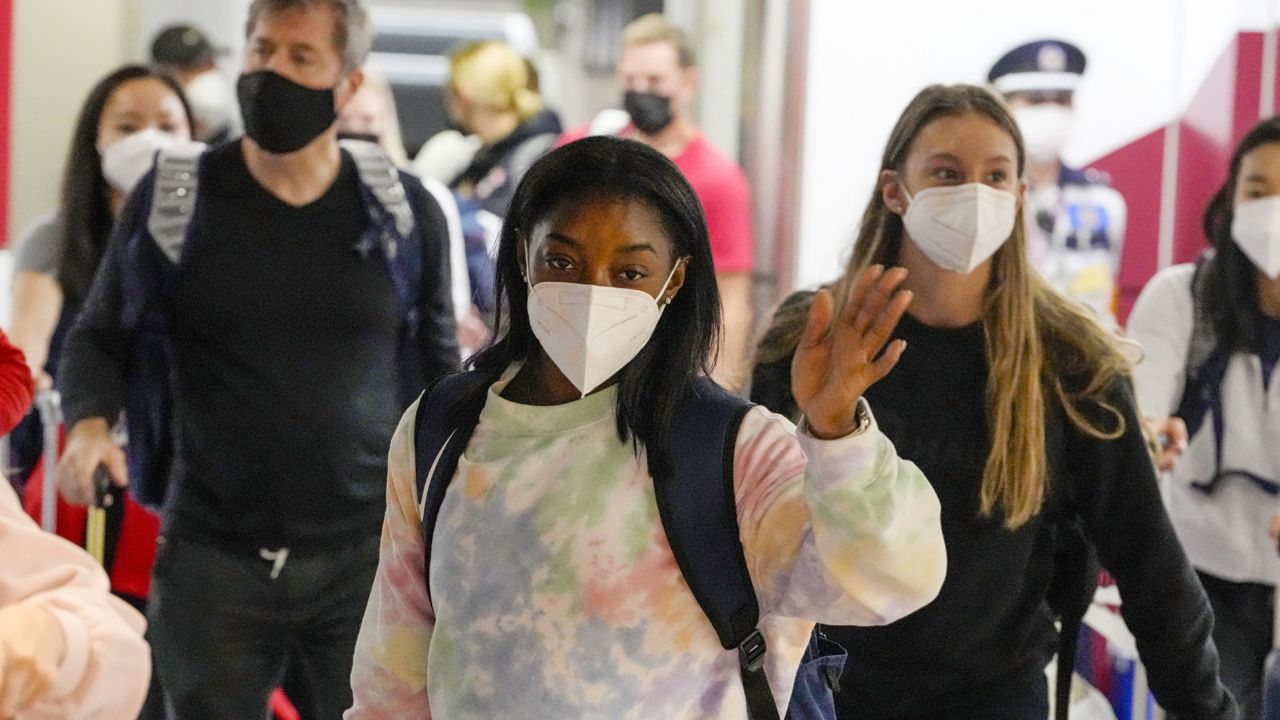Simone Biles is reflecting on her decision to pull out of the 2020 Tokyo Olympics halfway through the competition, saying she should “have never made another Olympic team” after the harrowing years leading up to this year’s competition.
In an expansive interview with New York Magazine, the 24-year-old offered a personal account of how the abuse she suffered at the hands of former USA Gymnastics (USAG) physician Larry Nassar continues to impact both her life and career years after the scandal came to light.
“If you looked at everything I’ve gone through for the past seven years, I should have never made another Olympic team,” Biles said in part.
Nassar, a physician who was renowned for treating athletes at the sport’s highest levels, was found to have sexually assaulted hundreds of victims and had thousands of images of child pornography in his possession. Nassar was ultimately charged in 2016 with federal child pornography offenses and sexual abuse charges in Michigan.
For a long time, Biles remained silent about the abuse she endured, and only revealed she was victimized by Nassar in a statement released to social media in early 2018.
In the years that followed, Biles understandably struggled with her mental health. “It was hard to be in the gym mentally some days,” she told New York Magazine.
Still, Biles kept competing — she never lost a meet, set multiple records and won numerous awards. As she trained for the 2020 Olympics, Biles also went to therapy, where she learned coping mechanisms on how to get through stressful situations and deal with potential triggers.
When it came time to leave for Japan this summer, Biles felt confident in her mental state, enough to consider herself done with therapy.
She told her therapist at the time: “I’m good enough to go. And they were like, ‘Yes, you’re good enough to go and do your stuff, but you have to come back.’ And I was like, ‘Nah, I’m good.’”
Biles is no stranger to competition. With 32 Olympic and World Championship medals, the 24-year-old is tied for the world’s most decorated gymnast; she won gold medals in the individual all-around, vault, and floor and bronze on balance beam in the 2016 Olympics.
“...At the end of the day, to accomplish everything I’ve done? That talent probably cannot be matched yet,” Biles told New York Magazine. “Looking at my stats, especially in gymnastics, where it’s so injury-filled — I’ve never had a huge injury stop me from a big meet. To be so healthy for so many years? That never happens. It’ll be a long time for somebody to accomplish what I’ve accomplished.”
But something happened when Biles competed in Tokyo.
The trouble started in the early days of her competition, when Biles struggled through a number of individual events.
“I was not physically capable,” she said. “Every avenue we tried, my body was like, ‘Simone, chill. Sit down. We’re not doing it.’ And I’ve never experienced that.”
Biles was resistant to the message her body was sending her until she attempted her vault performance, when she got what gymnasts call “twisties,” a dangerous failure of muscle memory for athletes performing dangerous stunts. Biles herself likens the feeling to waking up one day completely blind after a life of perfect vision.
“It’s basically life or death. It’s a miracle I landed on my feet,” Biles said of the event. “If that was any other person, they would have gone out on a stretcher. As soon as I landed that vault, I went and told my coach: ‘I cannot continue.’”
Biles finally accepted that her body and mind were no longer operating in harmony, and for the first time watched her teammates compete from the sidelines.
“I should have quit way before Tokyo, when Larry Nassar was in the media for two years,” Biles said. “It was too much. But I was not going to let him take something I’ve worked for since I was 6 years old. I wasn’t going to let him take that joy away from me. So I pushed past that for as long as my mind and my body would let me.”
It would be a trauma Biles was again forced to revisit during a recent hearing in front of the Senate Judiciary Committee earlier this month, when she and three other elite gymnasts offered a blistering condemnation of USAG and the FBI for its poorly mishandled investigation into Nassar.
Biles, the only of the four witnesses who competed in the 2020 Tokyo Olympics, said at the hearing she removed herself from the team finals to focus on her mental health. She returned to earn a bronze medal on beam but told the committee the lingering trauma from her abuse at the hands of Nassar played a factor in her decision to opt out of several competitions.
“To be clear: I blame Larry Nassar, but I blame an entire system that enabled and perpetrated his abuse,” she told lawmakers.
While the choice to pull out of the Olympics was a challenging one, Biles stands by her actions.
“Everybody asks, ‘If you could go back, would you?’ ” Biles told New York Magazine. “No. I wouldn’t change anything because everything happens for a reason. And I learned a lot about myself — courage, resilience, how to say no and speak up for yourself.”
Now, Biles is focused on herself: Healing, spending time with family and loved ones, and preparing for an upcoming tour with Team USA members. She recently presented at the Video Music Awards and walked the red carpet at the Met Gala.
“This will probably be something I work through for 20 years,” Biles said. “No matter how much I try to forget. It’s a work in progress.”
The Associated Press contributed to this report.



